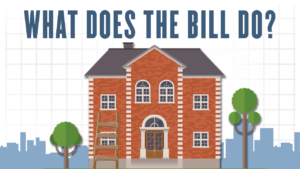King’s Speech announces Government to overhaul leasehold property rules
-
Plans unveiled to reduce costs and simplify the process for leaseholders to purchase their freehold.
-
King Charles III declares intention to abolish excessive service charges.
Today’s King’s Speech revealed that the Government is set to slash costs and streamline the process for leasehold property owners to acquire their freeholds.
Additionally, King Charles III outlined forthcoming measures aimed at halting the overcharging of leaseholders via excessive service fees.
The anticipated legislation to revamp the leasehold framework will likely address other exorbitant charges faced by leaseholders.
Included in the reforms is a proposal to limit current ground rents, thereby shielding leaseholders from payments that yield no service or advantage and may create obstacles during property sales.
“My Ministers will bring forward a bill to reform the housing market by making it cheaper and easier for leaseholders to purchase their freehold and tackling the exploitation of millions of homeowners through punitive service charges.”
- The Leasehold and Freehold Reform Bill delivers the Government’s manifesto commitments on leasehold reform. This decisive action will address one of the longest-term challenges that the country faces: fairness in the housing market.
- The Bill will make the long-term and necessary changes to improve home ownership for millions of leaseholders in England and Wales, by making it cheaper and easier for more leaseholders to extend their lease, buy their freehold, and take over management of their building.
- These reforms build on the success of the Leasehold Reform (Ground Rents) Act 2022, which put an end to ground rents for new, qualifying long residential leasehold properties in England and Wales as part of the most significant changes to property law in a generation.
What does the Bill do?
The Leasehold and Freehold Reform Bill will put the country on the right path for the future by giving homeowners a fairer deal in the following ways:
1. Empowering leaseholders:
- Making it cheaper and easier for existing leaseholders in houses and flats to extend their lease or buy their freehold – so that leaseholders pay less to gain security over the future of their home.
- Increasing the standard lease extension term from 90 years to 990 years for both houses and flats, with ground rent reduced to £0. This will ensure that leaseholders can enjoy secure, ground rent free ownership of their properties for years to come, without the hassle and expense of future lease extensions.
- Removing the requirement for a new leaseholder to have owned their house or flat for two years before they can benefit from these changes – so that more leaseholders can exercise their right to the security of freehold ownership or a 990-year lease extension as soon as possible.
- Increasing the 25 per cent ‘non-residential’ limit preventing leaseholders in buildings with a mixture of homes and other uses such as shops and offices, from buying their freehold or taking over management of their buildings – to allow leaseholders in buildings with up to 50 per cent non-residential floorspace to buy their freehold or take over its management.
2. Improving leaseholders’ consumer rights:
- Making buying or selling a leasehold property quicker and easier by setting a maximum time and fee for the provision of information required to make a sale (such as building insurance or financial records) to a leaseholder by their freeholder (known as ‘landlords’).
- Requiring transparency over leaseholders’ service charges – so all leaseholders receive better transparency over the costs they are being charged by their freeholder or managing agent in a standardised comparable format and can scrutinise and better challenge them if they are unreasonable.
- Replacing buildings insurance commissions for managing agents, landlords and freeholders with transparent administration fees – to stop leaseholders being charged exorbitant, opaque commissions on top of their premiums.
- Extending access to “redress” schemes for leaseholders to challenge poor practice. We will require more freeholders to belong to a redress scheme so leaseholders can challenge them if needed.
- Scrapping the presumption for leaseholders to pay their freeholders’ legal costs when challenging poor practice.
- Granting freehold homeowners on private and mixed tenure estates the same rights of redress as leaseholders – by extending equivalent rights to transparency over their estate charges, access to support via redress schemes, and to challenge the charges they pay by taking a case to a Tribunal, just like existing leaseholders.
- Building on the legislation brought forward by the Building Safety Act 2022, ensuring freeholders and developers are unable to escape their liabilities to fund building remediation work – protecting leaseholders by extending the measures in the Building Safety Act 2022 to ensure it operates as intended.
3. Reforming the leasehold market:
Banning the creation of new leasehold houses so that – other than in exceptional circumstances – every new house in England and Wales will be freehold from the outset
We will also consult on capping existing ground rents, to ensure that all leaseholders are protected from making payments that require no service or benefit in return, have no requirement to be reasonable, and can cause issues when people want to sell their properties. Subject to that consultation, we will look to introduce a cap through this Bill.
Territorial extent and application
- The Bill will extend and apply to England and Wales.
Key facts
- The Building Safety Act 2022 delivered far-reaching protections for leaseholders against remediation costs and an ambitious enforcement regime to hold freeholders and developers to account.
- There are 752,000 households with children and 1.48 million over-65s who are leasehold homeowners.
- Leasehold reform will support the housing market. 49 per cent of leaseholders are first time buyers, and 28 per cent of leaseholders are under 35. Land Registry data tells us that 22 per cent of residential property transactions in 2019 were leasehold – around 238,000 transactions in total. Almost all flats are sold on a leasehold basis compared to 6 per cent of houses.
- The current leasehold system leaves many homeowners trapped in their properties or facing extortionate costs to buy their freeholds, for example:
Case Study 1: Sian paid £225,000 in 2020 for her new build flat in Southend. Her lease had a ground rent indexation start date of March 2018 (when the development started) with 5-year reviews based on RPI, and so is now due for review. As a result, Sian has seen her ground rent rise from £350 to over £450 per year and she is braced for another RPI review in five years’ time.
Case Study 2: Zack bought a flat in North Yorkshire in 2008 with a ground rent of £300 and a 10-year doubling clause, meaning he now pays £600. Zack wants to sell the flat and is considering a lease extension to extinguish the ground rent as he does not think lenders will lend against a lease with the current ground rent terms. He has been quoted £25,000 to extend the lease and cannot afford to pay this sum.
- Our reforms will tackle these issues head on: o We are making it significantly cheaper for leaseholders to extend their leases. For example, a young first-time buyer in a £250,000 leasehold flat in Birmingham with 76 years left on the lease would currently have to pay around £16,000 to extend the lease plus around £10,000 to cover their costs and the freeholder’s costs. Under our reforms, they will now only pay around £9,000 plus their own legal costs for a 990-year extension – a saving of over £10,000.
The ground rents cap we are consulting on could save leaseholders up to an average of £250 in year one and £6,000 over the remaining term of their lease – that would be £250 back in people’s pockets each year. This will also make it easier for people to sell their properties and get mortgages.
More Property Blogs HERE:
Can you make money investing in property?
Section 24 Effect on BTL Property
How do I start a property rental business in the UK?
How to add value to your rental property
What are the requirements for a HMO UK?
How to convert a property into an HMO in 2023
Is refinancing the same as restructuring?
What is Refinancing? How does it Work?
BRR Property Deals: Buy Refurb Refinance in the UK
Should You Give Up on Buy-to-let?
A Guide to Section 24 Tax Change For Buy-to-Let Investors
Do I need a Licence to rent out my property UK?




